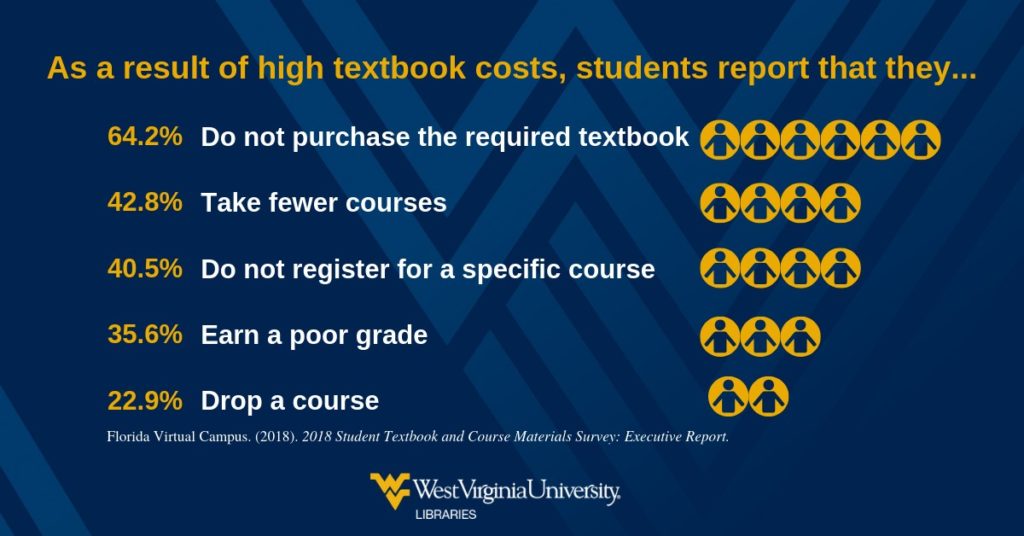Libraries offer ways to combat high cost of textbooks
Posted by Monte Maxwell.February 28th, 2019

As part of Open Education Week (March 4-8), West Virginia University Libraries, faculty and students are focusing on the high cost of textbooks.
Since 1978, the cost of college textbooks has risen 812%, a rate faster than medical services (575%), new home prices (325%) and the consumer price index (250%), according to statistics from the American Enterprise Institute.
The rising cost of textbooks impacts a student’s bank account as well as their grades. The Florida Virtual Campus has been studying the effect of rising textbooks costs on students’ purchasing decisions, their academic success and their awareness of OER options.
Their 2018 study found that the cost of textbooks continue to be a negative influence on students’ grades and success. A PDF of the “2018 Student Textbook & Course Materials Survey: Executive Summary is available at this link.
What can the WVU community do?
West Virginia University Libraries is working to alleviate the high cost of textbooks. We currently have four textbooks available on our Open Access Textbooks page.
Additionally, the WVU Libraries’ Open Education Resources Committee works with the Open Textbook Network to hold open textbook review sessions for faculty. During a single academic year, WVU students saved over $44,000.00 using open textbooks adopted by faculty.
How teaching faculty can help
The Libraries and the WVU Student Government Association advocate for open pedagogy and support the adoption of open textbooks by the WVU faculty community.
To help eliminate, or reduce, textbook costs for students, faculty can:
- Attend the Open Textbook Workshop on March 7 to write a short textbook review and earn a $200 stipend.
- Choose and adopt an open textbook from OpenStax, Open Textbook Library, or other sources.
- Check with the Libraries’ eReserves. What can you make available to your students without violating copyright and be within Fair Use?
- Consult your library liaison for more information, ideas for further involvement, or assistance with selecting free / open materials.
Learn the Lingo: Free vs. Open
Just because a source is “free” does not mean it is “open.” Free sources cannot be adapted, changed, or distributed by users without permission from copyright holders or these sources may only be temporarily free. Open sources will always be free in a digital format.
Learn the Lingo: What is Open?
What does “open” actually mean for open educational resources? According to OpenContent.org, open materials are those that enables users to Retain, Reuse, Revise, Remix, and Redistribute the materials, also known as the 5 Rs:
- Retain – the right to make, own, and control copies of the content (e.g., download, duplicate, store, and manage)
- Reuse – the right to use the content in a wide range of ways (e.g., in a class, in a study group, on a website, in a video)
- Revise – the right to adapt, adjust, modify, or alter the content itself (e.g., translate the content into another language)
- Remix – the right to combine the original or revised content with other material to create something new (e.g., incorporate the content into a mashup)
- Redistribute – the right to share copies of the original content, your revisions, or your remixes with others (e.g., give a copy of the content to a friend)
Learn the Lingo: Creative Commons
Creative Commons licensing allows content creators to share their work with others who can then re-share the content, adapt it, revise it, or redistribute it. It all depends on the type of Creative Commons’ license the creator has assigned.





